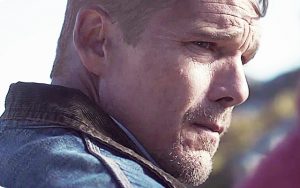Metro Canada: “The biopic Maudie: Love is like a “pair of odd socks.”
 By Richard Crouse – Metro Canada
By Richard Crouse – Metro Canada
In Maudie, a biopic of Nova Scotia folk artist Maud Lewis, Ethan Hawke plays Everett, the artist’s brusque husband. “You walk funny,” he says when he first meets her. “You a cripple? You sick?”
In other words, he’s not exactly a charmer.
“It’s always fun and such and such a great experience to get to play a character that audiences love,” says Hawke. “It feels really good but often to tell a really interesting story you have to play people who are badly behaved. I feel that as gruff and as unacceptable as a lot of Everett’s behaviour is, it is not uncommon at all of men of that time period. I remember my grandmother always accusing my grandfather of not wanting a wife but a maid. He’s somebody that in the course of that relationship learns how to love.”
As romance blossoms between them Maud’s art—handmade postcards, paintings—slowly gains fans, including Vice President Richard Nixon who purchased a landscape by mail. As Maud’s increasing recognition threatens Everett’s simple way of life their union becomes strained.
“I found that story really surprising and the subtle details of their internal power shifts, I thought, were really true to life. All long term relationships have strange power dynamics and the behaviour within the couple is always shifting about who’s in charge and in charge of what, and what that does to their love and how that changes.”
The couple is, as Maud says, “like a pair of odd socks.”
“I thought it was a beautiful journey to go from someone who was abusive to somebody who knew how to love and care for another person. That’s an interesting character to get to play.”
The script caught his eye not only because of the chance to play a complicated character but also because of his affinity for Nova Scotia.
“I bought a place in Nova Scotia probably in the late nineties. I’ve been going up there once or twice a year every since then. I love it up there.
“Through a friend of a friend they thought I might like the script just because I like Nova Scotia so much. They were right. Of course then they tricked me and the shooting ended up being in Newfoundland. I thought I could shoot this movie and live in my house, but I couldn’t.”
Maudie is a movie about small moments, an exchanged look, a caress. Like its real life inspirations the film is unpretentious, occasionally gruff but always honest and truthful.
“Most of us aren’t in giant espionage battles or helicopter chases. Most of us don’t need a superhero,” Hawke says. “For most of us the real events of our lives correspond around love. The losing of it, the gaining of it. How we feel about any given time period of our life has to do with that and I think it is very difficult to make love stories for adults because they’re very complicated.
“Arthur Miller has a great quote about how everybody is interested in stories about falling in love and getting married, or stories that start with a break up but end in somebody finding resolution but what is very difficult to do is show the actual relationship and I love this story for the messiness of the real life in it.”
